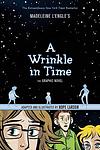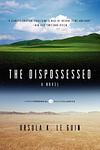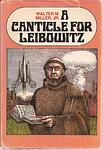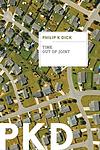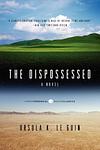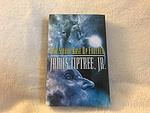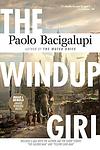The Greatest "Soft Science Fiction" Books of All Time
Click to learn how this list is calculated.
This list represents a comprehensive and trusted collection of the greatest books. Developed through a specialized algorithm, it brings together 286 'best of' book lists to form a definitive guide to the world's most acclaimed books. For those interested in how these books are chosen, additional details can be found on the rankings page.
Genres
Soft science fiction, often abbreviated as "soft sci-fi," is a subgenre of science fiction that emphasizes the social sciences, such as psychology, sociology, and anthropology, over the hard sciences like physics and chemistry. Unlike its counterpart, hard science fiction, which focuses on scientific accuracy and technical detail, soft science fiction explores the human condition, societal changes, and speculative futures through the lens of technology and its impact on society. This genre often delves into themes of ethics, culture, and human relationships, using futuristic settings and speculative technology as a backdrop to examine how these elements interact and affect individuals and societies. Soft science fiction is less concerned with the how and why of technology itself, and more interested in the implications and consequences of technological and societal evolution, making it a rich field for exploring complex characters, speculative societies, and philosophical questions.
Countries
Date Range
Reading Statistics
Click the button below to see how many of these books you've read!
Download
If you're interested in downloading this list as a CSV file for use in a spreadsheet application, you can easily do so by clicking the button below. Please note that to ensure a manageable file size and faster download, the CSV will include details for only the first 500 books.
Download-
1. A Wrinkle In Time by Madeleine L'Engle
The novel follows the story of a young girl named Meg Murry, her younger brother Charles Wallace, and their friend Calvin O'Keefe as they embark on a cosmic journey to rescue Meg and Charles Wallace's father. The father, a scientist, has been missing since he discovered a new planet using the concept of Tesseract, which is a wrinkle in time. Guided by three mysterious celestial beings, the children travel across different dimensions, face evil forces, and learn about the power of love and self-sacrifice.
-
2. The Stand by Stephen King
This post-apocalyptic horror/fantasy novel presents a world devastated by a deadly plague, killing 99% of the population. The survivors, drawn together by dreams of a charismatic and benevolent figure, gather in Boulder, Colorado to form a new society. However, a malevolent figure also emerges, attracting a following of his own and setting the stage for a classic battle between good and evil. The story delves into themes of community, morality, and the capacity for both destruction and regeneration within humanity.
-
3. The Left Hand Of Darkness by Ursula K. Le Guin
The novel is a groundbreaking work of science fiction that explores themes of gender, politics, and identity. Set on a planet called Gethen, where the inhabitants are ambisexual, shifting between male and female, the story follows an envoy from Earth who struggles to understand this alien society. As he navigates the complex political landscape of Gethen, he must also grapple with his own preconceptions about gender and sexuality. The book is a profound exploration of difference, otherness, and what it means to be human.
-
4. Stranger in a Strange Land by Robert A. Heinlein
The novel follows the life of Valentine Michael Smith, a human who was raised on Mars and returns to Earth in early adulthood. Smith struggles to understand human culture, norms, and conventions, while also possessing extraordinary psychic abilities. As he navigates Earth society, he begins to question many of its institutions and values, ultimately creating his own religion to pass on the wisdom he gained on Mars. The book explores themes of freedom, self-reliance, and the nature of humanity, and is considered a classic of science fiction literature.
-
5. Solaris by Stanislaw Lem
The novel is a psychological exploration of human limitations and failures set against the backdrop of space exploration. When a psychologist arrives at a research station orbiting a distant planet covered entirely by a sentient ocean, he discovers the crew in disarray, haunted by physical manifestations of their subconscious fears and desires. As he grapples with the ocean's inscrutable nature and its unsettling ability to materialize human thoughts, he is forced to confront his own guilt and regret, embodied by the apparition of his deceased wife. The story is a philosophical meditation on the impossibility of truly understanding alien intelligence and the painful isolation of the human condition.
-
6. Never Let Me Go by Kazuo Ishiguro
The novel is a haunting tale of three friends, who grow up together at a seemingly idyllic English boarding school. As they mature, they discover a dark secret about their school and the purpose of their existence, which is to become organ donors for the rest of society. The story is a profound exploration of what it means to be human, the morality of scientific innovation, and the heartbreaking reality of love and loss.
-
7. Cloud Atlas by David Mitchell
This novel is a unique blend of six different stories, each set in a different time and place, spanning from the 19th century South Pacific to a post-apocalyptic future. Each tale is written in a different style, reflecting the time and setting it represents, and they are all connected through shared themes and recurring motifs. The stories are nested within each other, with each interrupted by the next, only to be concluded in the second half of the book. The novel explores themes of predacity, civilization, reincarnation and the eternal recurrence of the same behaviors throughout history.
-
8. The Sirens of Titan by Kurt Vonnegut
The novel explores the life of Malachi Constant, the richest man in a future America, who has gained his wealth due to his father's foresight in investing in companies that benefit from the space race. The narrative takes him from Earth to Mars, Mercury, back to Earth, and finally to one of Saturn's moons, Titan. Along the way, he experiences a series of bizarre, humorous, and tragic events that reveal the senselessness of war and the emptiness of a life devoid of love. The novel offers a biting critique of capitalism, militarism, and religion, while also exploring themes of free will, determinism, and the search for meaning.
-
9. The Dispossessed by Ursula K. Le Guin
The novel is a profound exploration of two vastly different societies on twin planets, Urras and Anarres. The protagonist is a brilliant physicist from Anarres, a planet with an anarchist society, who travels to Urras, a planet with a capitalist and authoritarian regime. The book explores his struggle to reconcile his anarchist beliefs with the stark realities of a different socio-political system. It's a thought-provoking investigation of human nature, power structures, and the idea of utopia.
-
10. A Canticle for Leibowitz by Walter M. Miller
"A Canticle for Leibowitz" is a post-apocalyptic science fiction novel that explores the cyclical nature of history through the lens of a Catholic monastery in the American Southwest. After a devastating nuclear war, the monks of the Albertian Order of Leibowitz work to preserve the remnants of mankind's scientific knowledge until the world is again ready for it. Over the course of centuries, civilization rises and falls, wars are fought, and scientific advancements are rediscovered and then lost again. The novel is a poignant commentary on the potential for humanity to repeat its mistakes.
-
11. The Fifth Season by N. K. Jemisin
A woman searches for her kidnapped daughter in a world ravaged by a catastrophic climate change event known as the Fifth Season. Simultaneously, the narrative follows a young girl with destructive powers and a man struggling to control his own similar abilities. The story explores themes of oppression, survival, and the destructive power of nature, all set in a dystopian world where the earth is constantly in flux, and society is strictly divided and controlled.
-
12. Parable Of The Sower by Octavia E. Butler
In a dystopian future where society has collapsed due to environmental and economic crises, a young woman named Lauren Olamina possesses a unique ability to feel the pain and pleasure of others. As she witnesses her community being torn apart by violence and religious fanaticism, Lauren embarks on a perilous journey to find a new safe haven and establish her own religion based on empathy and survival. Through her thought-provoking narrative, the book explores themes of resilience, spirituality, and the power of human connection in the face of adversity.
-
13. Martian Time Slip by Philip K. Dick
"Martian Time Slip" is a science fiction novel set in a future where humans have colonized Mars. The story follows a group of characters, including a repairman, a government official, and a schizophrenic boy, as they navigate the complexities of Martian society and the challenges of living on a harsh and unforgiving planet. Through their experiences, the book explores themes of time manipulation, mental illness, and the struggle for survival in an alien environment.
-
14. The Illustrated Man by Ray Bradbury
"The Illustrated Man" is a collection of eighteen science fiction short stories that revolve around the mysterious figure of the illustrated man, whose body is covered in moving tattoos that predict the future. Each story explores themes of technology, humanity, and the consequences of our actions, taking readers on a thought-provoking journey through dystopian worlds, alien encounters, and the depths of human imagination. With vivid imagery and compelling narratives, the book delves into the complexities of human nature and the potential dangers of our own creations.
-
15. Oryx and Crake by Margaret Atwood
Set in a post-apocalyptic world, the novel follows the life of Snowman, who believes he may be the last human on earth, as he struggles to survive in a new, harsh environment. He is surrounded by genetically modified creatures, and his only companions are the Crakers, human-like beings created by his brilliant but disturbed friend Crake. Through Snowman's memories, the story of how the world came to be this way is revealed, involving a love triangle with the mysterious Oryx and the catastrophic consequences of Crake's scientific experiments.
-
16. Dawn by Octavia E. Butler
"Dawn" is a thought-provoking science fiction novel that explores themes of identity, power, and humanity's capacity for change. Set in a post-apocalyptic world, the story follows Lilith Iyapo, a woman who wakes up after centuries of being in suspended animation to find herself among an alien race called the Oankali. The Oankali offer to help humanity rebuild, but their assistance comes at a cost: interbreeding with them to create a new hybrid species. As Lilith navigates the complex dynamics of her new reality, she must confront her own fears and prejudices while grappling with the moral implications of the choices she faces.
-
17. The Sea And Summer by George Turner
"The Sea and Summer" by George Turner is a dystopian novel set in a future Australia where climate change and economic disparity have created a stark divide between the rich and the poor. The story follows the lives of two families, the Kents and the Coulters, as they struggle to survive in a decaying city plagued by extreme weather conditions and social unrest. As tensions rise and the gap between social classes widens, the characters must confront the harsh realities of their world and make difficult choices to ensure their survival.
-
18. The Word For World Is Forest by Ursula K. Le Guin
"The Word For World Is Forest" is a thought-provoking science fiction novel that explores the consequences of human colonization and exploitation of a peaceful forest planet inhabited by the indigenous Athsheans. As the humans ruthlessly exploit the planet's resources and enslave the Athsheans, a group of Athshean rebels rise up to fight for their freedom, leading to a clash of cultures and an examination of the destructive nature of imperialism and the importance of respecting the environment and the rights of other beings.
-
19. Her Smoke Rose Up Forever by James Tiptree Jr.
"Her Smoke Rose Up Forever" is a collection of science fiction stories that explore complex themes such as gender and identity through a speculative lens. The anthology brings together some of the most powerful and thought-provoking short stories written by a pioneering author in the genre, known for their ability to weave deep psychological insights with futuristic settings and technologies. The narratives often challenge societal norms and human nature, offering a unique and often unsettling perspective on the potential directions of human evolution and the ethical dilemmas that might arise.
-
20. The Lathe Of Heaven by Ursula K. Le Guin
In a dystopian future, George Orr possesses the unique ability to alter reality through his dreams. However, he is haunted by the consequences of his unintentional changes. Seeking help, he is referred to a psychiatrist who becomes fascinated with George's power. As they delve deeper into George's dreams, their actions have far-reaching effects, blurring the boundaries between dreams and reality. This thought-provoking novel explores the ethical implications of playing god and the delicate balance between the power of imagination and the dangers of unchecked control.
-
21. Perelandra by C. S. Lewis
"Perelandra" is a science fiction novel that follows the protagonist, Dr. Elwin Ransom, on a journey to the planet Perelandra. There, he encounters a new Eden-like world inhabited by a beautiful and innocent woman named Tinidril. As Ransom tries to protect Tinidril from the temptations of a malevolent force, he must confront his own inner struggles and make choices that will determine the fate of Perelandra and its inhabitants. With thought-provoking themes of good versus evil and the nature of temptation, "Perelandra" explores the complexities of human nature and the consequences of our actions.
-
22. The Chrysalids by John Wyndham
"The Chrysalids" is a captivating science fiction novel set in a post-apocalyptic world where the inhabitants of a small community strictly adhere to a religious doctrine that condemns any form of mutation or deviation. The story follows a young boy named David, who possesses telepathic abilities that he must conceal to avoid persecution. As David grows older, he becomes increasingly aware of the intolerance and hypocrisy of his society, leading him to question the rigid beliefs he has been raised with and ultimately embark on a dangerous journey to find acceptance and understanding.
-
23. Planet Of The Apes by Pierre Boulle
In this thought-provoking novel, a group of astronauts crash-land on a planet where apes are the dominant species and humans are primitive creatures. The story follows the protagonist as he struggles to survive and understand this upside-down world, ultimately challenging the reader's notions of civilization, intelligence, and the nature of humanity.
-
24. The Windup Girl by Paolo Bacigalupi
Set in a future Thailand amidst a world ravaged by climate change and depleted resources, the story unfolds in a bustling city where biotech corporations vie for supremacy. The narrative centers around a genetically engineered "New Person," known as the Windup Girl, who is trapped in a life of servitude and exploitation. As the city teeters on the brink of political and environmental collapse, the fates of various characters—including a foreign energy investor, a disgraced geneticist, and a street-smart refugee—intertwine with that of the Windup Girl. Together, they navigate a treacherous landscape of corporate greed, oppressive government, and social upheaval, in a desperate search for survival and redemption in a world where every action has unforeseen consequences.
-
25. Beggars In Spain by Nancy Kress
"Beggars In Spain" by Nancy Kress is a thought-provoking science fiction novel set in a future where genetic engineering allows parents to create "Sleepless" children who do not need to sleep. The story follows Leisha Camden, a Sleepless who faces discrimination and persecution from those who view her kind as a threat. As Leisha strives to find her place in a society divided by class and prejudice, she becomes embroiled in a battle for the future of humanity. Through its exploration of societal divisions, the novel raises questions about the nature of humanity, the pursuit of perfection, and the consequences of scientific advancement.
Reading Statistics
Click the button below to see how many of these books you've read!
Download
If you're interested in downloading this list as a CSV file for use in a spreadsheet application, you can easily do so by clicking the button below. Please note that to ensure a manageable file size and faster download, the CSV will include details for only the first 500 books.
Download